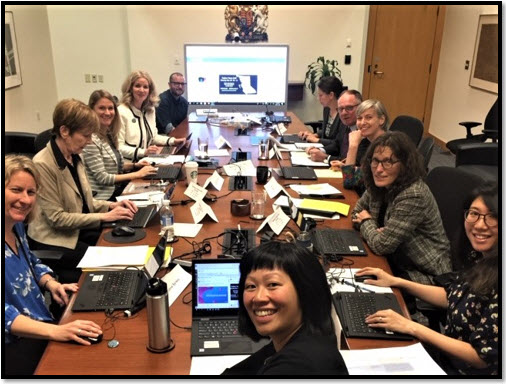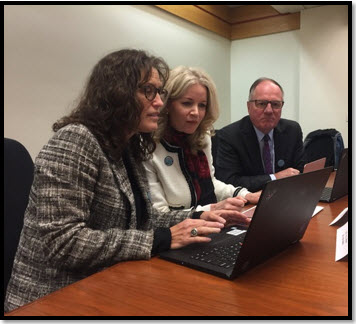BC courts continued to expand their use of social media to interact with the public when the Provincial Court of BC’s Chief Judge Melissa Gillespie hosted the province’s Chief Justice, Robert Bauman, and Jennifer Muller, a former self-represented litigant (SRL), in a live Twitter Town Hall on October 28, 2019.
Tweeting from the BC Provincial Court’s Twitter account, @BCProvCourt, the panel engaged in dynamic discussion with a wide variety of groups and individuals about progress being made in the access to justice (A2J) movement and the challenges not yet met.
The numbers were impressive - in a two hour period, the Twitter Town Hall panelists issued almost 150 tweets in response to more than 170 questions and comments, all using the hashtag #A2JChatBC.
The event was organized by Provincial Court staff, working with the Court of Appeal and Access to Justice BC (A2JBC) to prepare, promote the Town Hall, and support the panelists during two hours of intense tweeting. Also present in the “operations room” for the event were representatives of Courthouse Libraries BC and the Canadian Bar Association BC Branch who had assisted with promotion and been involved in the Court’s previous Twitter Town Halls. The atmosphere in the room was vibrant, and a model of the collaborative approach advocated by A2JBC.

Participants at the Office of the Chief Judge
It was a ground-breaking occasion in several ways. The courts recognized the importance of involving justice system users in designing solutions to access to justice problems when they invited an advocate for SRLs to participate with the chief judges. Jennifer Muller’s thoughtful comments and eloquent expression of SRLs’ perspectives were seen as a highlight by the other panelists.
Perhaps the most striking tweets were the panelists’ responses to a question from the Law Society of BC:
Chief Justice Bauman replied:
Chief Judge Gillespie added:
Ms. Muller tweeted a similar response to another question:
It bodes well for improving access to justice when not just a former SRL but the leaders of BC’s Court of Appeal and Provincial Court advocate trying new things and not being strait-jacketed by tradition.

Chief Judge Gillespie, Ms. Jennifer Muller, Chief Justice Bauman
Another highlight was the tweet from Nova Scotia’s Chief Justice Michael Wood sharing experience from his province in a video message. There were many appreciative comments about his participation and the opportunity the Town Hall offered to share A2J information across Canada.
Chief Justice Bauman reflected on the benefits of our Twitter Town Hall in a post last week on the National Self Represented Litigants Project blog:
These discussions are extremely valuable and have the potential to lead to meaningful action and change.”
He gave as an example one topic that came up during the Twitter Town Hall – “the use (or misuse) of litigants’ time spent waiting for their cases to be called”. Acknowledging that the problem “is a burden not just on the individuals affected but also on the economy”, the Chief Justice agreed there must be a solution and declared his intent to explore options for improving the situation for litigants waiting for their cases to proceed.
Ms. Muller agreed that the event was valuable, saying “The Twitter Town Hall was a remarkable milestone. Not only were there two chief judges responding to tweets, a self-represented litigant was also included on the panel. Including the public in the access to justice dialogue is an important step in understanding the user perspective.”
Chief Judge Gillespie said, “The third BC Provincial Court Twitter Town Hall built on the success of the first two. The participation of Chief Justice Bauman and Ms. Muller in this year’s Town Hall added important voices to the Twitter conversation about access to justice. We were gratified by the enthusiastic participation of people and groups passionately engaged in access to justice issues, although we had hoped to see even greater participation from law students and lawyers working in their own ways to increase access to justice. We’ll be examining how to facilitate this communication in future.”
Other topics raised during the Town Hall included:
• how to eliminate barriers for people with disabilities
• the media’s role in access to justice
• broadening the services that legal professionals other than lawyers can provide
• examples of projects currently enhancing A2J
• reducing the volume of documents litigants need to file
• the future of Indigenous courts
• public involvement in judicial appointments
• the value of collaborative, user-focused, experimental and evidence-based reforms
• use of video appearances
• expansion of online courts
• the Courts’ efforts to improve access to justice, and how are they working to reduce barriers
• the importance of support workers, non-legal navigators and a team approach to meeting legal needs
• advice for law students and lawyers wanting to make A2J a priority
• the importance of judges and lawyers talking openly about mental health challenges
• changes in the art displayed in courthouses reflecting cultural changes
• how to share rape victims’ experiences effectively
• family law issues
• the importance of law school clinics in teaching a people-centred approach to legal services and an understanding of barriers
See the discussion for yourself at #A2JChatBC and follow @BCProvCourt on Twitter.

